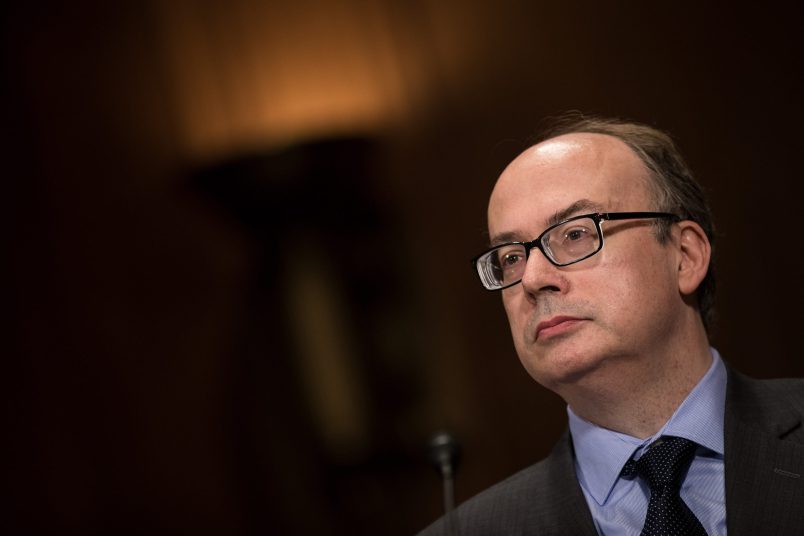House and Senate committees are getting a clearer picture of the depth and breadth of former President Trump’s campaign to enlist the Justice Department in his effort to overturn the results of last year’s election.
Former acting Attorney General Jeffrey Rosen and former acting Deputy Attorney General Richard Donoghue both testified before the Senate Judiciary Committee last week, while both that panel and the House Oversight Committee have obtained reams of emails from the Justice Department documenting the final months of the Trump presidency.
The emails, as reported by Politco, show the consequences of an order issued by then-Attorney General Bill Barr in November 2020 which allowed federal law enforcement to conduct election-related investigations before vote certification had concluded.
In one Dec. 7 email, FBI second-in-command David Bowditch referenced the change in policy, telling Donoghue in the message: “Everyone understood that before the election we should not do these types of inquiries, but we are in a place right now in this election cycle in which these types of allegations are important to vet out, particularly when many in the country are still questioning the results.”
Bowditch wrote the email after a lower-level head of the DOJ’s public integrity unit had advocated against conducting investigations into fraud allegations in Georgia, writing that they were obviously false and that acting on the claims would make the Justice Department appear “partisan.”
Donoghue replied that he agreed, and reportedly in a later message said that the FBI needed to re-interview Georgia elections officials who had already been interviewed by state authorities.
“It may well be that the GA SOS is correct in concluding that nothing nefarious happened there, but the fact is that millions of Americans have come to believe (rightly or wrongly) that something untoward took place and it is incumbent on the Department to timely conduct a limited investigation to assure the American people that we have looked at these claims,” Donoghue wrote.
He reportedly later added that, should the FBI conclude that there was no fraud in Georgia, that would bolster confidence in the election. If agents found evidence of fraud, “then we’ll deal with that,” Donoghue reportedly wrote.
“The AG made it clear that he wants to be sure that we are actually doing our job and not just standing on the sidelines,” he added.
The emails highlight the extent to which Trump-era DOJ officials were initially willing to not dismiss claims that the election had been stolen. Though Donoghue suggests in the messages that the claims themselves are bunk, he shows that federal law enforcement was, for a time, willing to conduct investigations so far as to debunk them.
By the end of December, however, Barr had left the DOJ. It was then left to Donoghue and Rosen to defend against further attempts to involve the DOJ directly in the election, as Trump pressed the two officials to declare the election corrupt.
Rosen, the Washington Post reported, told Senators on Saturday that Trump was “persistent” in trying to co-opt federal law enforcement to cast doubt on the election.
Part of that, Rosen reportedly said, had to do with Jeffrey Bossert Clark – the then-acting chief of the DOJ’s civil division who circulated a letter in which the Department would declare that the election in Georgia had been corrupted.
Trump purportedly wanted to replace Rosen with Clark as acting attorney general.
Rosen reportedly told senators that he had to “persuade the president not to pursue a different path,” in a January meeting that eventually prevented that plan from going into action.
“The president was persistent with his inquiries, and I would have strongly preferred that he had chosen a different focus in the last month of his presidency,” Rosen reportedly said in his opening statement.
He later added that he “disagreed with things that President Trump suggested the Justice Department do with regard to the election. So we did not do them.”







Um, just how many more alarms have to sound before the indictments are issued?
It rained hard on the donkey farm, and everyone was scrambling to cover their ass.
He later added that he “disagreed with things that President Trump suggested the Justice Department do with regard to the election. So we did not do them.”
As far as Trump’s ultimate criminal culpability in all this, we’re going to see “We did not do them” as his last line of defense. Sure, he suggested, cajoled, maybe even ordered criminal acts. But they weren’t performed, he was thwarted, everyone stood up to him and said no. The no harm, no foul defense.
“Hey, you can’t blame a guy for trying.”
I cannot fully express how much I fucking hate this type of polite, institution-esque equivocation. You know what he did, Rosen. You know what he is. For the sake of the country, cannot you not just speak plainly?
Fun Fact: Donkeys hate to get wet. Makes their skin itchy.